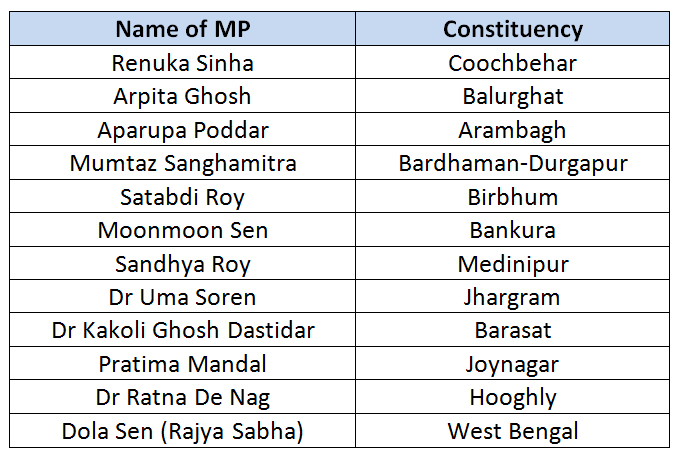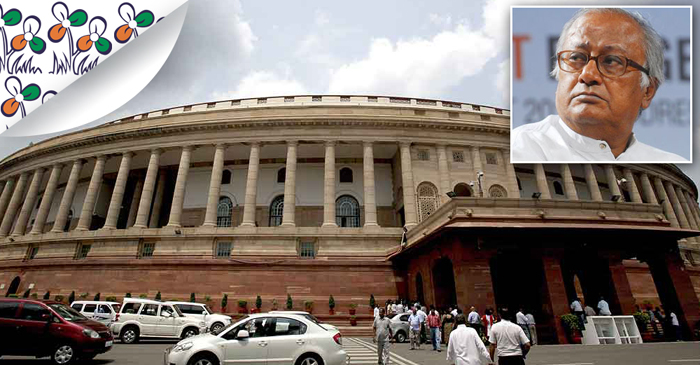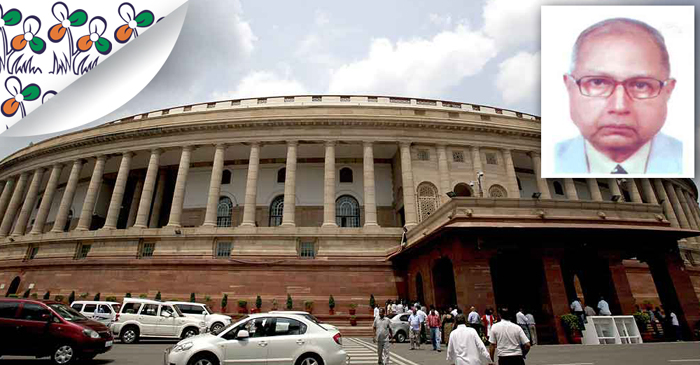Full transcript:
Sir, Jab hum is Budget ki or nazar dalte hai toh pehle paragraph teen me adarniya Mantri ji ne bahut achhe dhang se ek kavita sunai. Unhone sunai ki – “Kuch toh phul khilaye humne aur kuch phool khilne hai.” Bahut achhi kavita hai. Toh mujhe yeh kavita sunte hue Md Rafi sahab ki ek purani geet bhi yaad aagayi – “ki baharo phul barsao mera mehoob aya hai, mera mehoob aya hai.”
Toh yeh Budget aam janta ki mehooba bankar ayi hai ki nahi so toh dekhna hai. Na toh me arthashastra hu na me arthashastra samajhta hun.
So Hon’ble Members mujhe maaf kar dena agar maine kuch galat bol diya toh. Mujhe lagta hai ki yeh jo Budget hai yeh ek kahani hai – ek kahani hai toofan aur diye ki. Isse woh bole toofan macha degi aur bechari aam janta ki asha ke diye jo abhi bhi jal rahi hai woh kahin bujh toh nahi jayegi? Yeh sawal paida hota hai.
Sir, the Babus of North Block have done a remarkable jugglery of statistics and I shall come to that one after another.
First of all at the outset, I would like to show how the jugglery has been done. Taken at face-value, because much has been talked about GDP growth. The story of growth is the inbuilt story of every Budget and this Budget is no exception to that. So taken at face value, the Indian economy will grow by 7.4% this fiscal year outpacing China from the world’s fastest growing economy but a revision in the method of calculation has left analysts and Government’s own chief economic advisors doubting how far the data can be trusted.
The GDP growth in 2010-11 was calculated based on factor cost which has now has been changed to constant prices to take into account gross value addition in goods and services as well as indirect taxes. Besides the base year has been shifted to 2011-12 from 2004-2005 earlier.
Sir, the Statistics Ministry takes the previous years’ growth at 6.9% as against 4.7% estimated previously, a revision which led to some economists including RBI Governor Sri Raghuram Rajan seeking more clarity and the RBI Governor is on record saying that we do need to spend more time to understand the GDP numbers. So, here the jugglery starts.
Now Sir, the story of financial empowerment of the states. I need not say anything on this because of my little knowledge in economics. However, I may quote the opinion of a former Finance Minister of India. I quote the opinion of a former Finance Minister which was published in The Hindu newspaper on the 3 of this month which inter alia states and I quote,
“The Finance Commission’s recommendations on raising the shares of states in the divisive pool of central taxes from 32% to 42% have been cleverly managed. The states’ share in absolute numbers, budget estimates to budget estimates (from current year to next year’s budget) has gone up from this year to the next by around Rs 1.36 Lakh Crore.
The Central Plan Assistance to the States has gone down from Rs 338000 Crore to Rs 205000 Crore. Therefore the two cancel each other out.
Sir, he continues, “Thus, the net additional central resources transferred to the States including States’ share of taxes and duties, non plan grants and loans, central assistance to State Plans, assistance to centrally sponsored schemes is only Rs 64000 Crore in 2015-16.”
Only Rs 64000 Crore is to be distributed among the 29 States and 7 UTs. This is the state of affairs that has been projected by the former Finance Minister of India. Sir, if I say the name, the Hon’ble Minister of State, Finance, who is sitting in the House, may be embarrassed, so I am not taking the name. One should understand that who said this.
Much drum has been beaten on the question of special assistance. The drum beating started before the Budget was placed in the other House. They said that special assistance has been given to West Bengal and Bihar, my friends from Bihar must listen to me, because they are our neighbours. Nothing is visible in this Budget Speech. Sir, nothing is being said in the Budget Speech about the type of special package that is to be given to Bihar and West Bengal. Later, the Finance Minister clarified that the special assistance was not in terms of money but it would be some incentives in the form of tax exemptions to the investors, provided that the investors go into Bihar and West Bengal and invest in the manufacturing sector. That is the special package to the Bihar and West Bengal; no other states should be envious about West Bengal getting a special package. Sir, this is also the story of Andhra Pradesh and Telengana.
Sir, I would like to refer to the Volume I of the Report of the Finance Commission, published in 2014. At page 89, paragraph 8.10, Finance Commission while making its recommendations, they decided what they have observed, related issue in the assistance of vertical imbalances is the issue of non divisible pool of recourses namely cess and surcharges. The 1st line of this paragraph says, “That the share of cess and surcharges of the Gross Tax Revenue of the Union Government has increased from 7.53% in 2000-2001 and to 13.14% in 2013-2014. The cess and surcharge collected by the Central Government has almost doubled compared to the year 2000-2001. The States have argued that; this denies the States of their rightful share in the devolution.”
The observation of the Finance Commission is that, “Earlier successive Finance Commissions have recommended that Union Government review the current position with respect to the non divisive pool arising out of cess and surcharges and take measure to reduce their share in the Gross Tax Revenue. However, this has not happened. There are two ways of addressing this legitimate concern of the State. What are the two ways to address the concern of the States? One is an Amendment in the Constitution to include these in the divisive pools or increase the share of divisive pools to compensate the States on this account. We rule the first option, given the experience so far.”
Although the successive Finance Commission has recommended this, but the State Government remained a mute spectator to the report, they did not move an inch ahead to implement the recommendations of the successive Finance Commission. The 14th Finance Commission has said that the Amendment to the Constitution is a distant possibility now.
This Government has come up with so many amendments to the Constitution. Why not introduce another amendment to the Constitution, so that cess and surcharge are also included in the divisive pool?
This is a question, I would like to raise in the House.
Budget estimated of 2014 – 2015 and 2015 – 2016 shows that net resources transferred to states and union territories has increased by Rs 63997 Crore which is only 1.5% of the Centre’s Gross Tax Revenue whereas Centre’s share of category B and C schemes will come down to Rs. 66233 Crore. Therefore, on one hand the states are getting Rs 63997 Crore of the central gross tax revenue and on the other the B category and C category of the schemes of the Central Government will now come down to Rs 66233 Crore therefore the net loss for the states compared to previous years will be Rs 2226 crore during the 2015 – 2016 Financial Year.
Sir, if the states have to sustain the BRFG program and other smaller schemes, this budget has not provided a single paisa for those schemes. All the expenses shall have to be borne by the states only. This is how the story of Centre’s cash paid to states show only on papers.
Now Sir, I would like to mention about the allocation to various schemes, many Hon’ble members have mentioned about that, maybe some repetitions are there but I cannot but mention some of them. On a quick look as to how the allocations in different schemes have been slashed shows that the allocation for welfare of the scheduled castes have come down to Rs 30851 Crore in 2015 – 2016 compared to Rs 43,208 Crore in 2014 – 2015, that is about Rs 13000 Crore reduction. What about tribal welfare? It has come down to Rs 19980 Crore in 2015 – 2016 from Rs 26700 Crore in 2014 – 2015. That is almost Rs 8000 Crore less than the previous year for tribal welfare.
Sir, reduction of allocation during the coming fiscal compared to previous year in regard to ICDS and mid-day meal scheme, my good friend Pavan Verma as already mentioned and left, that has come down by half from over Rs 16000 Crore to just Rs 8000 Crore in 2015 – 2016, so this is the Government’s plan for ICDS and mid-day meal. This is the plan of the Government for women welfare and child welfare.
Sir, the budgetary allocation for housing and poverty alleviation has been reduced from Rs 6008 Crore in the previous year to Rs 5634 Crore in the current budget. Budgetary allocation for the tribal has been cut by Rs 5000 Crore as I already mentioned. Budget for Sarva Shiksha Abhiyan has been reduced by 9.5%. The much touted Beti Bachao, Beti Padhao get only Rs 100 Crore . I wonder whether this is a budget of the Central Government or the Zilla Panchayat. I cannot understand that only Rs 100 Crore has been allocated for Beti Bachao Beti Padhao! Much trumpeting was done. And what has my State made? West Bengal led by the Hon’ble Chief Minister Smt Mamata Banerjee, the State Government has allocated Rs 850 Crore for Kanyashree project which has been acclaimed and accepted even by the United Nations.
Even yesterday, the Hon’ble Minister Maneka ji was praising the Kanyashree project like anything in her reply to the issue of women and child development; she is also present here. So, this is the state of the Central Government’s Beti Bachao, Beti Padhao, kaise bachegi? Kaise padhegi? Sau Crore sarae desh me? Malum nahi.
The symbolic increase in the allocation for MGNREGA will make the survival struggle of the poor people more painful. In the context of galloping inflation.
Sir, all of us know that Millennium Development Report of 2014 of the United Nations; and I repeat again and again, whenever I get a chance that India is a land where the world’s one third poorest of the poor live, and their number is 40 Crore , which is also one third of our population. What is in this budget for those 40 Crore people?
No answer, no mention, not a single word has been attributed by the Central Government in the Union Budget. This is a shame on the part of the Central Government I must say.
Sir, however, now it is important, the Hon’ble Finance Minister has assured that he will allocate additional Rs 5,000 Crore to MGNREGA only if, there are some ifs and buts so only if there is an increase in revenue receipt. So we have to wait. Only if, there is increase in revenue receipt then Hon’ble Finance Minister will allocate. This is the position.
Sir, Bangali me ek kahawat hai – saat mon tell o purbe na, radha o nachbe na aur usi ko mai Hindi me kehta hu – na toh girdhar ki murli bajegi na madhuban me radhika nachegi. Aisa prabandh kiya gaya.
Allocation to education sector has been reduced by Rs 32,912 Crore and the housing schemes for poor reduced by Rs 14,887 Crore as well as in this Budget.
These are the achievements of this Government. BJP ka koi mitra yeha bol rahe the, bahut safalta mil gai, kasi amrit pila ja raha hai, yeh toh samundar ka manthan ho raha hai. Yeh devta ban gaye hai aur isliye amrit pan kar rahe hai toh halahal kaun pan karega? Halahal toh aam janta ko hi paan karne parega. Yeh samundar manthan ho rahe hai yeha.
In our childhood we were taught that health is wealth but this Budget does not approve that is why the health allocation in this Budget has been reduced by Rs 2011 Crore that is 5.7% reduction where as my Government, my State Government, Mamata Banerjee’s Government has raised the health allocation by 16.91% in this year’s Budget. Sir, a State can do it but Centre cannot do it. Centre is only reducing, reducing and reducing.
Sir, Gandhi ji once said that India lives in villages and therefore villagers primary relief on agriculture, yeh sarkar kisano ka sarkar hai, yeh sarkar garibo ka sarkar hai, aise bhasan hum bahut sune chunao ke pehle. Jitne garib hai, jitney kisan hai hamare pass a jayo, hum tumko sahi raste pe le jayenge – bataya gaya tha. Abhi keya achhe din aye hai – abh kya dekh rahe hai Budget me, yeh sarkar krishi kshetro me amantan jo ki 2014-15 me 9.5% the ghatakar is bitta barsh me matlab ane wale bitta barsh me 2.7% kar diya hai. Krishi Kshetro me bhi ghata diya aur yeh bolta hai ki hum kisaan ki sarkar hai, garibo ki sarkar hai.
Notwithstanding the fact, that this will severely hurt the rural Indians and also lead to a decline in agricultural growth, Agricultural growth ghat jayega, thak jayega koi soch vichar nehi hai. Corporate, Corporate, Corporate chilla rahe hai.
Even the ruling party has forgotten its election manifesto. Do bullet point election manifesto se mai refer karna chahata hu – Election Manifesto of BJP party is a tall promise that it would increase public investment in agriculture and would also enhance profitability in agriculture by ensuring atleast 50% profit over cost of production. Aur isiliye agricultural allocation ko is tarah ghata diya gaya, taki unka Election Manifesto puri ho. Election Manifesto ki puri hone ka rasta hai?
Sir, atleast seven schemes in agriculture sector, due to paucity of time I cannot show them, atleast seven schemes in the agricultural sector have got arbitrarily reduced. The allocation has been arbitrarily reduced.
Sir, allocation for National Food Security Mission has been reduced from Rs 18,304 Crore in 2014-15 to Rs 13,000 Crore for 2015-16. So this Government wants to secure food for the poor people this is why the allocation has been reduced. Global Hunger index has already mentioned the situation in India is alarming, the budgetary allocation made in the food subsidy could have been higher for eradication of hunger and malnutrition. The Government has taken an opposite route. The Hon’ble Finance Minister, even for once has not uttered in his Budget Speech about the Government’s concern about food security. Nowhere in the speech, has he mentioned about food security. The earlier Government, I must say, tried to ensure and implement.
It is clear from the Budget Speech of the Hon’ble Finance Minister that the Government is more inclined to corporate welfare, by slashing Corporate Tax. Apart from this, the Government revenue forgone in form of incentives and exemption to the corporate in the current fiscal is estimated to go over Rs 62,398 Crore and the beneficiaries will only be the corporate who are microscopic minorities among the 125 Crore population of the country. All though, Hon’ble Finance Minister has claimed that humare Sarkar corporate ki bhi hai, aam janta ki bhi hai, leken meinne jo aankra dekhaya woh Budget se nikal ke, woh sare akhre garib o ke khilaf hai, kisan o ke khilaf hai aur corporate ka paksh mein hai. Iye Sarkar corporate ka Sarkar hai. yeh Sarkar corporate ki nirdesh par chalti hai. Aur yehi natija hai ki, Budget mein aisa reflection aya hai.
Sir, Shri Arun Jaitley Ji, I respect him; everyone respects him, sara Hindustan uska bahut izzat karte hai. He belongs to my biradari. Shri Arun Jaitley Ji is not here. If I remember correctly, subject to corrections when he was a Leader of Opposition he said, IT exemptions should be to the limit of Rs 5 lakh. How much exemption has he granted in this year’s Budget? I need not elaborate. There is no room for the middle class to rejoice of the Budget.
Another important point is Sir, the implementation of GAAR, General Anti Avoidance Rules. We have heard enough of it for a number of times over the number of years. I have been putting questions, year after year, what about the implementation of GAAR. The former Finance Minister in his Budget Speech has said, that it will be implemented from 1 April, 2015. Now, in this year it is said that GAAR will be deferred for two years. I do not know, whether it is deferred indefinitely. I would like to quote a reply from a question I had put earlier. The one line reply was, GAAR will be applicable to the financial income of 2015-16 (Assessment Year: 2016-17) and subsequent years. This is the answer the Finance Minister has given to me for the question number 3364 on 23 December, 2014. What happened between the two months so that it is not deferred by two years of for an indefinite period?
Sir, on the conclusion, that on a final analysis I must say that this Budget is anti people, full of rhetoric, jugglery of statistics, and it appears to me that the same has been drafted by a fortune teller and reminds me of Oscar Wilde who once said, “Someone, who knows the price of everything and the value of nothing.”
Yeh Budget shayad humko bol rahi hai ki tum apne soch ki jangal me raha bhatko, aur phir kho jao, aur phir so jao.
Thank you.





